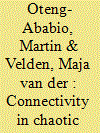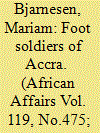|
|
|
Sort Order |
|
|
|
Items / Page
|
|
|
|
|
|
|
| Srl | Item |
| 1 |
ID:
180684


|
|
|
|
|
| Summary/Abstract |
This article investigates the proliferation of informal mobile phone markets and contributes to the understanding of the changing urban economic geographies in Africa. It enriches comparative research by modestly bringing new theoretical ideas to bear, and explores how the spatial geography of mobile phone markets mediates urban governance. We argue that regardless of where in Accra mobile phone markets emerge, the same kind of processes and activities develop, and this recognition contrasts other works, which either focus on the city as a whole or on specific sites. Using key informant interviews, augmented with cognitive mapping, we observe the geography of mobile phone repairs and sales, intersecting socio-economic factors, and a collaborative culture among participants. Ultimately, our article touches upon the issues of power and agency by elucidating the relational dynamics between the informal operators and city authorities.
|
|
|
|
|
|
|
|
|
|
|
|
|
|
|
|
| 2 |
ID:
172582


|
|
|
|
|
| Summary/Abstract |
On 31 January 2019, masked men wearing national security apparel allegedly stormed the residence of the National Democratic Congress (NDC) candidate Delali Kwasi Brempong and opened fired on NDC party activists gathering for the by-elections in the Ayawaso West Wuogon electoral district in Ghana’s capital, Accra. The shooting occurred not far from the La Bawaleshie polling station and spread panic among those assembled there to cast their votes. Six persons were officially confirmed injured by gunshots as the masked men were reported to have fired indiscriminately among party activists.1 Videos of the tumultuous election-day scenes went viral: masked men, armed and in uniform, bullet holes, blood-stained walls, and wounded civilians. Frustrated NDC activists and party members were filmed accusing the government of orchestrating the attack as critically injured persons were rushed to the hospital.2 Later in the day, the police assured the public that calm had been restored to the area. Voters and residents of the constituency were encouraged to remain calm and to go about their duties freely and without fear.3 But the reassuring words of the police rang empty for many Ghanaians: with a by-election in the capital turned deadly, and a general election to come only a year later, the Ghanaian electorate seemed to have all the reasons to be fearful.
|
|
|
|
|
|
|
|
|
|
|
|
|
|
|
|
| 3 |
ID:
097329


|
|
|
| 4 |
ID:
163746


|
|
|
|
|
| Summary/Abstract |
Intra- and inter-regional migration is widely described. Prior studies have attribute varied reasons for this development including the quest for greener pastures and unequal development in northern Ghana. What has escaped critical scrutiny is some migrants’ ability to escape extreme rural poverty, albeit in harsh urban environment. Such a missing gap can potentiate high policy failures, hence the need for academic attention. Using a mixed method, we focus on two informal daily livelihoods as exemplars – exceptionalism – in Accra. We see their embedded organisational vitality and dynamic networks as illuminating for good livelihood practices, proper city governance and fostering economic empowerment. We call on city authorities to take cognisance of such complexities and heterogeneity of production–labour relations, failure of which can spell doom for policies ostensibly initiated to curb migration, as they are likely to be underpinned by factual inaccuracies and may result in ill-fated interventions.
|
|
|
|
|
|
|
|
|
|
|
|
|
|
|
|
| 5 |
ID:
089471


|
|
|
|
|
| Publication |
2009.
|
| Summary/Abstract |
There is a common perception in Ghana that Accra Hearts of Oak is the soccer club of the National Democratic Congress, and Kumasi Asante Kotoko that of the New Patriotic Party. In this paper we explore the roots of these perceptions by examining the social history of these two clubs specifically, and the Ghanaian soccer league system in general, with an eye for the actors, practices and events that injected political airs into purportedly 'apolitical' athletic competitions. With this social history clearly defining the popularly perceived 'us' versus 'them' of the Hearts/Kotoko rivalry, we analyse on the basis of a modest survey some of the assumptions these widely held stereotypes rely upon. We find that ethnicity and location matter both in terms of predicting one's affinity for a given soccer club and partisan inclinations. These factors do not, however, completely dispel the relationship between sports and politics as spurious. Though not conclusive, there is enough evidence collected in the survey to suggest that one's preferred club, even when controlling for ethnicity and location, does have an effect on one's partisan leanings, or perhaps vice versa. This finding highlights the independent role that often-understudied cultural politics can play.
|
|
|
|
|
|
|
|
|
|
|
|
|
|
|
|
|
|
|
|
|